208LEGEL - Land Registration System: Property Law and Analysis
VerifiedAdded on 2023/04/25
|8
|2342
|499
Essay
AI Summary
This essay provides an overview of the land registration system in Wales and England, focusing on its aim to reflect the totality of estates, interests, and charges affecting land. It discusses the three essential principles of land registration: the mirror principle, the insurance principle, and the curtain principle. The essay further explores the principle of trust and co-ownership, highlighting how the land registration system aims to protect both buyers and individuals with interests in the land. It also addresses the limitations of the mirror principle under the LRA 1925 and how the Land Registration Act 2002 seeks to address these issues. The essay concludes by emphasizing the importance of the mirror principle in ensuring transparency and accuracy in land transactions, while also acknowledging the challenges in achieving a perfect reflection of all interests and rights in the land register. Desklib provides access to past papers and solved assignments for students.
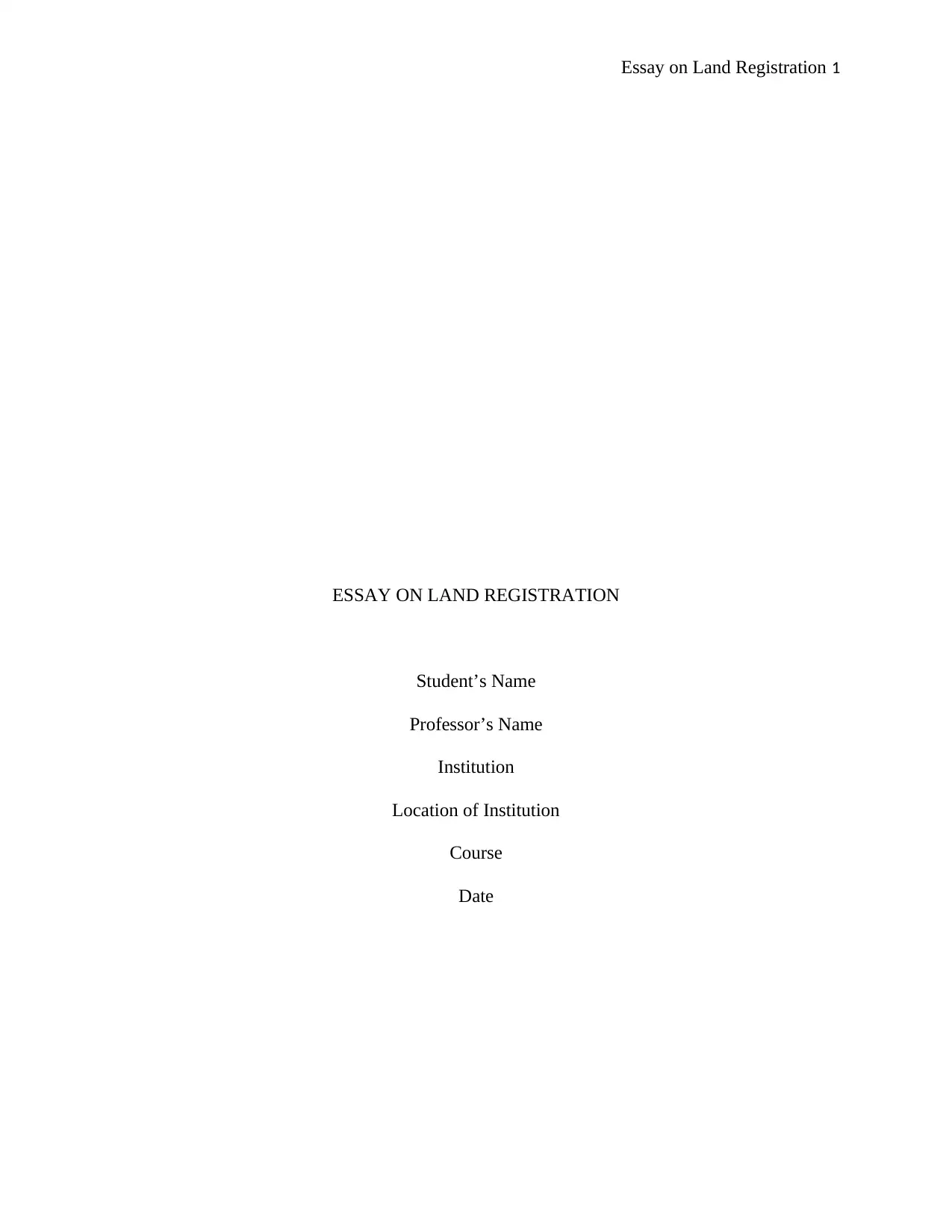
Essay on Land Registration 1
ESSAY ON LAND REGISTRATION
Student’s Name
Professor’s Name
Institution
Location of Institution
Course
Date
ESSAY ON LAND REGISTRATION
Student’s Name
Professor’s Name
Institution
Location of Institution
Course
Date
Paraphrase This Document
Need a fresh take? Get an instant paraphrase of this document with our AI Paraphraser
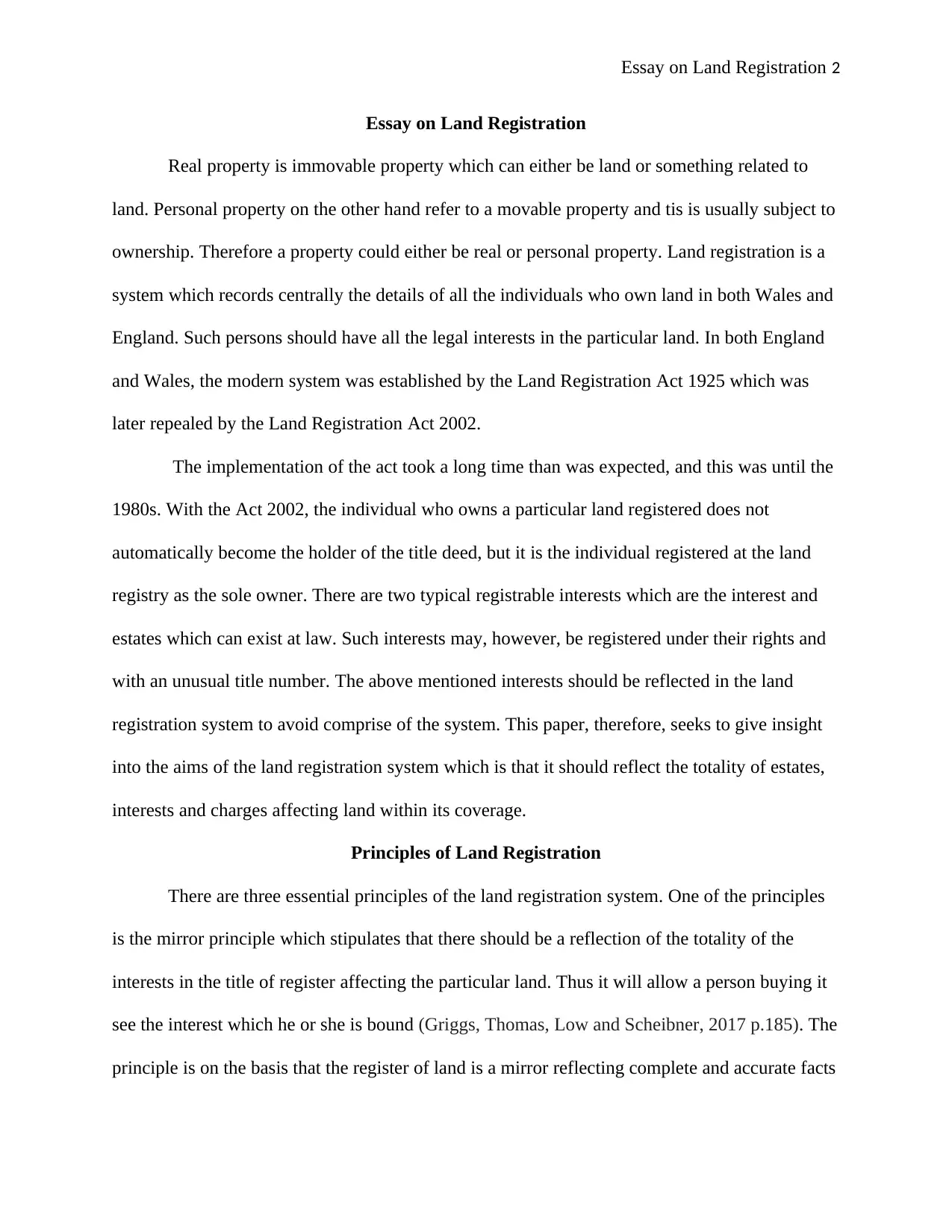
Essay on Land Registration 2
Essay on Land Registration
Real property is immovable property which can either be land or something related to
land. Personal property on the other hand refer to a movable property and tis is usually subject to
ownership. Therefore a property could either be real or personal property. Land registration is a
system which records centrally the details of all the individuals who own land in both Wales and
England. Such persons should have all the legal interests in the particular land. In both England
and Wales, the modern system was established by the Land Registration Act 1925 which was
later repealed by the Land Registration Act 2002.
The implementation of the act took a long time than was expected, and this was until the
1980s. With the Act 2002, the individual who owns a particular land registered does not
automatically become the holder of the title deed, but it is the individual registered at the land
registry as the sole owner. There are two typical registrable interests which are the interest and
estates which can exist at law. Such interests may, however, be registered under their rights and
with an unusual title number. The above mentioned interests should be reflected in the land
registration system to avoid comprise of the system. This paper, therefore, seeks to give insight
into the aims of the land registration system which is that it should reflect the totality of estates,
interests and charges affecting land within its coverage.
Principles of Land Registration
There are three essential principles of the land registration system. One of the principles
is the mirror principle which stipulates that there should be a reflection of the totality of the
interests in the title of register affecting the particular land. Thus it will allow a person buying it
see the interest which he or she is bound (Griggs, Thomas, Low and Scheibner, 2017 p.185). The
principle is on the basis that the register of land is a mirror reflecting complete and accurate facts
Essay on Land Registration
Real property is immovable property which can either be land or something related to
land. Personal property on the other hand refer to a movable property and tis is usually subject to
ownership. Therefore a property could either be real or personal property. Land registration is a
system which records centrally the details of all the individuals who own land in both Wales and
England. Such persons should have all the legal interests in the particular land. In both England
and Wales, the modern system was established by the Land Registration Act 1925 which was
later repealed by the Land Registration Act 2002.
The implementation of the act took a long time than was expected, and this was until the
1980s. With the Act 2002, the individual who owns a particular land registered does not
automatically become the holder of the title deed, but it is the individual registered at the land
registry as the sole owner. There are two typical registrable interests which are the interest and
estates which can exist at law. Such interests may, however, be registered under their rights and
with an unusual title number. The above mentioned interests should be reflected in the land
registration system to avoid comprise of the system. This paper, therefore, seeks to give insight
into the aims of the land registration system which is that it should reflect the totality of estates,
interests and charges affecting land within its coverage.
Principles of Land Registration
There are three essential principles of the land registration system. One of the principles
is the mirror principle which stipulates that there should be a reflection of the totality of the
interests in the title of register affecting the particular land. Thus it will allow a person buying it
see the interest which he or she is bound (Griggs, Thomas, Low and Scheibner, 2017 p.185). The
principle is on the basis that the register of land is a mirror reflecting complete and accurate facts
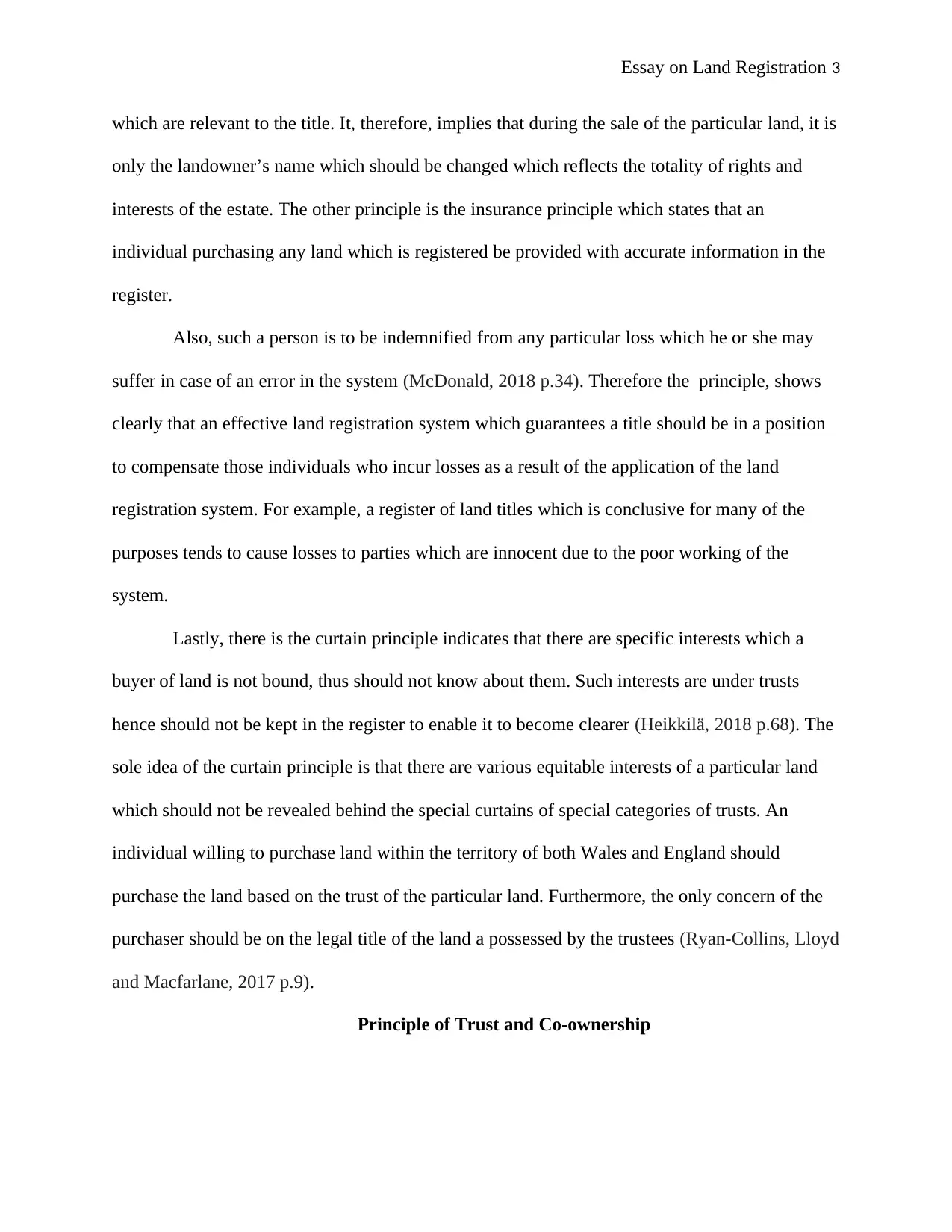
Essay on Land Registration 3
which are relevant to the title. It, therefore, implies that during the sale of the particular land, it is
only the landowner’s name which should be changed which reflects the totality of rights and
interests of the estate. The other principle is the insurance principle which states that an
individual purchasing any land which is registered be provided with accurate information in the
register.
Also, such a person is to be indemnified from any particular loss which he or she may
suffer in case of an error in the system (McDonald, 2018 p.34). Therefore the principle, shows
clearly that an effective land registration system which guarantees a title should be in a position
to compensate those individuals who incur losses as a result of the application of the land
registration system. For example, a register of land titles which is conclusive for many of the
purposes tends to cause losses to parties which are innocent due to the poor working of the
system.
Lastly, there is the curtain principle indicates that there are specific interests which a
buyer of land is not bound, thus should not know about them. Such interests are under trusts
hence should not be kept in the register to enable it to become clearer (Heikkilä, 2018 p.68). The
sole idea of the curtain principle is that there are various equitable interests of a particular land
which should not be revealed behind the special curtains of special categories of trusts. An
individual willing to purchase land within the territory of both Wales and England should
purchase the land based on the trust of the particular land. Furthermore, the only concern of the
purchaser should be on the legal title of the land a possessed by the trustees (Ryan-Collins, Lloyd
and Macfarlane, 2017 p.9).
Principle of Trust and Co-ownership
which are relevant to the title. It, therefore, implies that during the sale of the particular land, it is
only the landowner’s name which should be changed which reflects the totality of rights and
interests of the estate. The other principle is the insurance principle which states that an
individual purchasing any land which is registered be provided with accurate information in the
register.
Also, such a person is to be indemnified from any particular loss which he or she may
suffer in case of an error in the system (McDonald, 2018 p.34). Therefore the principle, shows
clearly that an effective land registration system which guarantees a title should be in a position
to compensate those individuals who incur losses as a result of the application of the land
registration system. For example, a register of land titles which is conclusive for many of the
purposes tends to cause losses to parties which are innocent due to the poor working of the
system.
Lastly, there is the curtain principle indicates that there are specific interests which a
buyer of land is not bound, thus should not know about them. Such interests are under trusts
hence should not be kept in the register to enable it to become clearer (Heikkilä, 2018 p.68). The
sole idea of the curtain principle is that there are various equitable interests of a particular land
which should not be revealed behind the special curtains of special categories of trusts. An
individual willing to purchase land within the territory of both Wales and England should
purchase the land based on the trust of the particular land. Furthermore, the only concern of the
purchaser should be on the legal title of the land a possessed by the trustees (Ryan-Collins, Lloyd
and Macfarlane, 2017 p.9).
Principle of Trust and Co-ownership
⊘ This is a preview!⊘
Do you want full access?
Subscribe today to unlock all pages.

Trusted by 1+ million students worldwide
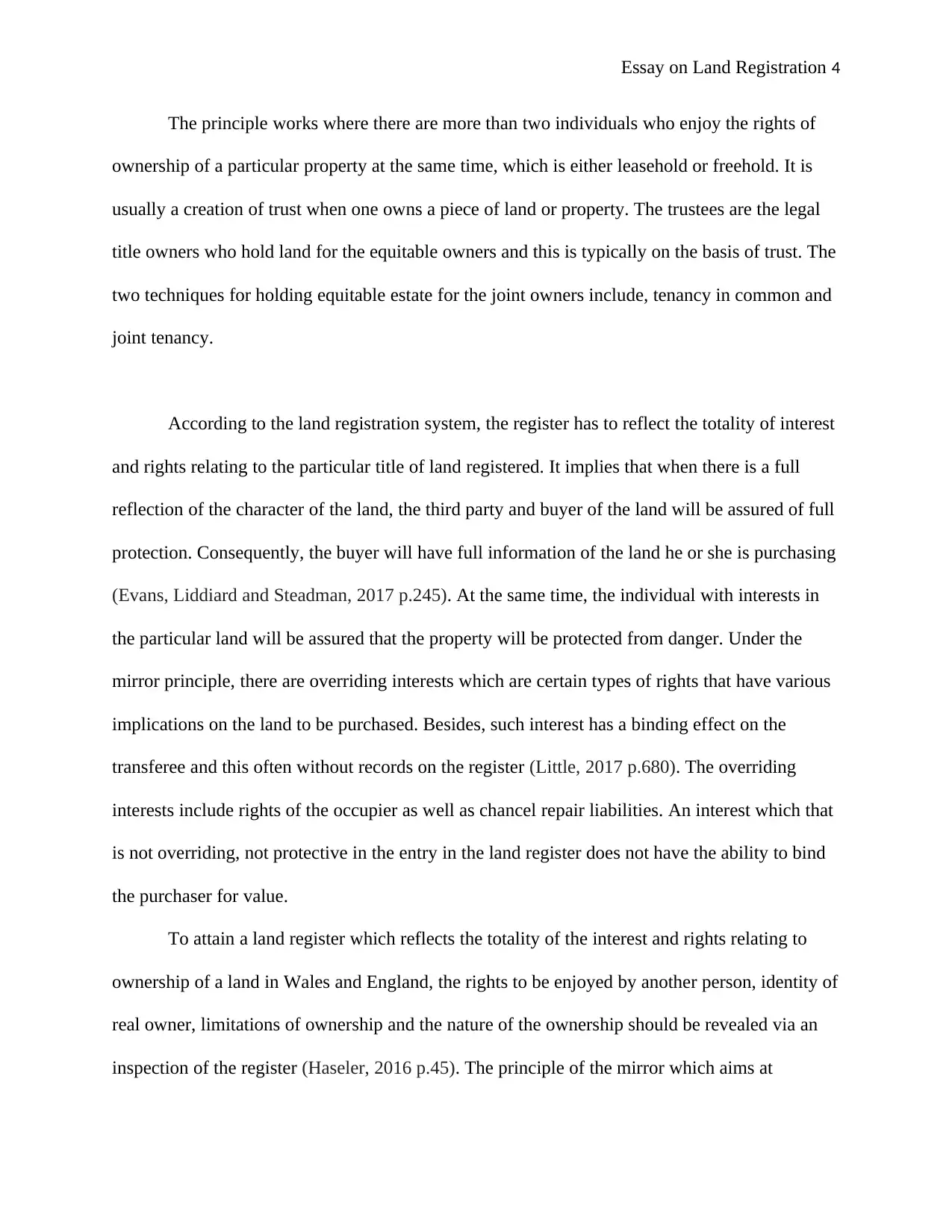
Essay on Land Registration 4
The principle works where there are more than two individuals who enjoy the rights of
ownership of a particular property at the same time, which is either leasehold or freehold. It is
usually a creation of trust when one owns a piece of land or property. The trustees are the legal
title owners who hold land for the equitable owners and this is typically on the basis of trust. The
two techniques for holding equitable estate for the joint owners include, tenancy in common and
joint tenancy.
According to the land registration system, the register has to reflect the totality of interest
and rights relating to the particular title of land registered. It implies that when there is a full
reflection of the character of the land, the third party and buyer of the land will be assured of full
protection. Consequently, the buyer will have full information of the land he or she is purchasing
(Evans, Liddiard and Steadman, 2017 p.245). At the same time, the individual with interests in
the particular land will be assured that the property will be protected from danger. Under the
mirror principle, there are overriding interests which are certain types of rights that have various
implications on the land to be purchased. Besides, such interest has a binding effect on the
transferee and this often without records on the register (Little, 2017 p.680). The overriding
interests include rights of the occupier as well as chancel repair liabilities. An interest which that
is not overriding, not protective in the entry in the land register does not have the ability to bind
the purchaser for value.
To attain a land register which reflects the totality of the interest and rights relating to
ownership of a land in Wales and England, the rights to be enjoyed by another person, identity of
real owner, limitations of ownership and the nature of the ownership should be revealed via an
inspection of the register (Haseler, 2016 p.45). The principle of the mirror which aims at
The principle works where there are more than two individuals who enjoy the rights of
ownership of a particular property at the same time, which is either leasehold or freehold. It is
usually a creation of trust when one owns a piece of land or property. The trustees are the legal
title owners who hold land for the equitable owners and this is typically on the basis of trust. The
two techniques for holding equitable estate for the joint owners include, tenancy in common and
joint tenancy.
According to the land registration system, the register has to reflect the totality of interest
and rights relating to the particular title of land registered. It implies that when there is a full
reflection of the character of the land, the third party and buyer of the land will be assured of full
protection. Consequently, the buyer will have full information of the land he or she is purchasing
(Evans, Liddiard and Steadman, 2017 p.245). At the same time, the individual with interests in
the particular land will be assured that the property will be protected from danger. Under the
mirror principle, there are overriding interests which are certain types of rights that have various
implications on the land to be purchased. Besides, such interest has a binding effect on the
transferee and this often without records on the register (Little, 2017 p.680). The overriding
interests include rights of the occupier as well as chancel repair liabilities. An interest which that
is not overriding, not protective in the entry in the land register does not have the ability to bind
the purchaser for value.
To attain a land register which reflects the totality of the interest and rights relating to
ownership of a land in Wales and England, the rights to be enjoyed by another person, identity of
real owner, limitations of ownership and the nature of the ownership should be revealed via an
inspection of the register (Haseler, 2016 p.45). The principle of the mirror which aims at
Paraphrase This Document
Need a fresh take? Get an instant paraphrase of this document with our AI Paraphraser
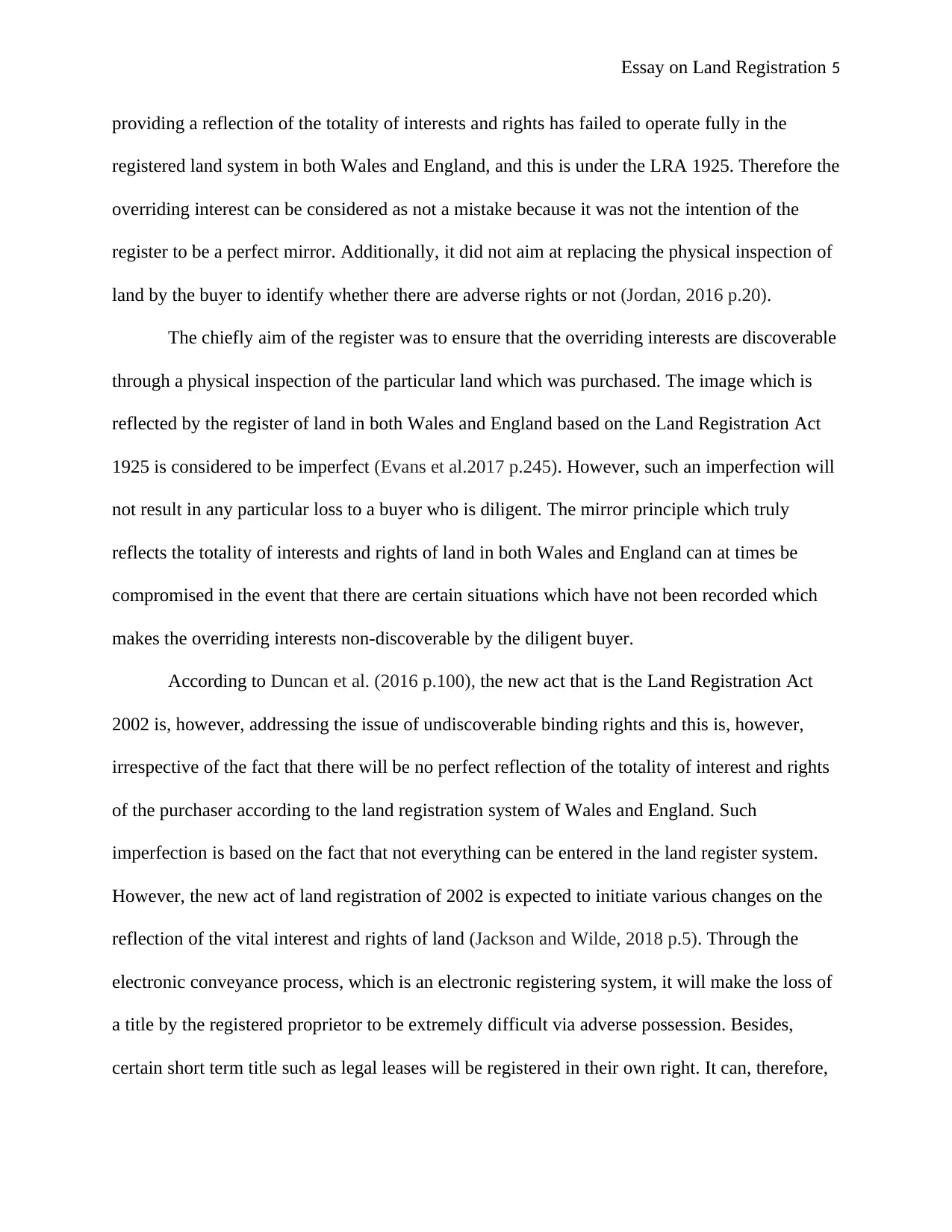
Essay on Land Registration 5
providing a reflection of the totality of interests and rights has failed to operate fully in the
registered land system in both Wales and England, and this is under the LRA 1925. Therefore the
overriding interest can be considered as not a mistake because it was not the intention of the
register to be a perfect mirror. Additionally, it did not aim at replacing the physical inspection of
land by the buyer to identify whether there are adverse rights or not (Jordan, 2016 p.20).
The chiefly aim of the register was to ensure that the overriding interests are discoverable
through a physical inspection of the particular land which was purchased. The image which is
reflected by the register of land in both Wales and England based on the Land Registration Act
1925 is considered to be imperfect (Evans et al.2017 p.245). However, such an imperfection will
not result in any particular loss to a buyer who is diligent. The mirror principle which truly
reflects the totality of interests and rights of land in both Wales and England can at times be
compromised in the event that there are certain situations which have not been recorded which
makes the overriding interests non-discoverable by the diligent buyer.
According to Duncan et al. (2016 p.100), the new act that is the Land Registration Act
2002 is, however, addressing the issue of undiscoverable binding rights and this is, however,
irrespective of the fact that there will be no perfect reflection of the totality of interest and rights
of the purchaser according to the land registration system of Wales and England. Such
imperfection is based on the fact that not everything can be entered in the land register system.
However, the new act of land registration of 2002 is expected to initiate various changes on the
reflection of the vital interest and rights of land (Jackson and Wilde, 2018 p.5). Through the
electronic conveyance process, which is an electronic registering system, it will make the loss of
a title by the registered proprietor to be extremely difficult via adverse possession. Besides,
certain short term title such as legal leases will be registered in their own right. It can, therefore,
providing a reflection of the totality of interests and rights has failed to operate fully in the
registered land system in both Wales and England, and this is under the LRA 1925. Therefore the
overriding interest can be considered as not a mistake because it was not the intention of the
register to be a perfect mirror. Additionally, it did not aim at replacing the physical inspection of
land by the buyer to identify whether there are adverse rights or not (Jordan, 2016 p.20).
The chiefly aim of the register was to ensure that the overriding interests are discoverable
through a physical inspection of the particular land which was purchased. The image which is
reflected by the register of land in both Wales and England based on the Land Registration Act
1925 is considered to be imperfect (Evans et al.2017 p.245). However, such an imperfection will
not result in any particular loss to a buyer who is diligent. The mirror principle which truly
reflects the totality of interests and rights of land in both Wales and England can at times be
compromised in the event that there are certain situations which have not been recorded which
makes the overriding interests non-discoverable by the diligent buyer.
According to Duncan et al. (2016 p.100), the new act that is the Land Registration Act
2002 is, however, addressing the issue of undiscoverable binding rights and this is, however,
irrespective of the fact that there will be no perfect reflection of the totality of interest and rights
of the purchaser according to the land registration system of Wales and England. Such
imperfection is based on the fact that not everything can be entered in the land register system.
However, the new act of land registration of 2002 is expected to initiate various changes on the
reflection of the vital interest and rights of land (Jackson and Wilde, 2018 p.5). Through the
electronic conveyance process, which is an electronic registering system, it will make the loss of
a title by the registered proprietor to be extremely difficult via adverse possession. Besides,
certain short term title such as legal leases will be registered in their own right. It can, therefore,
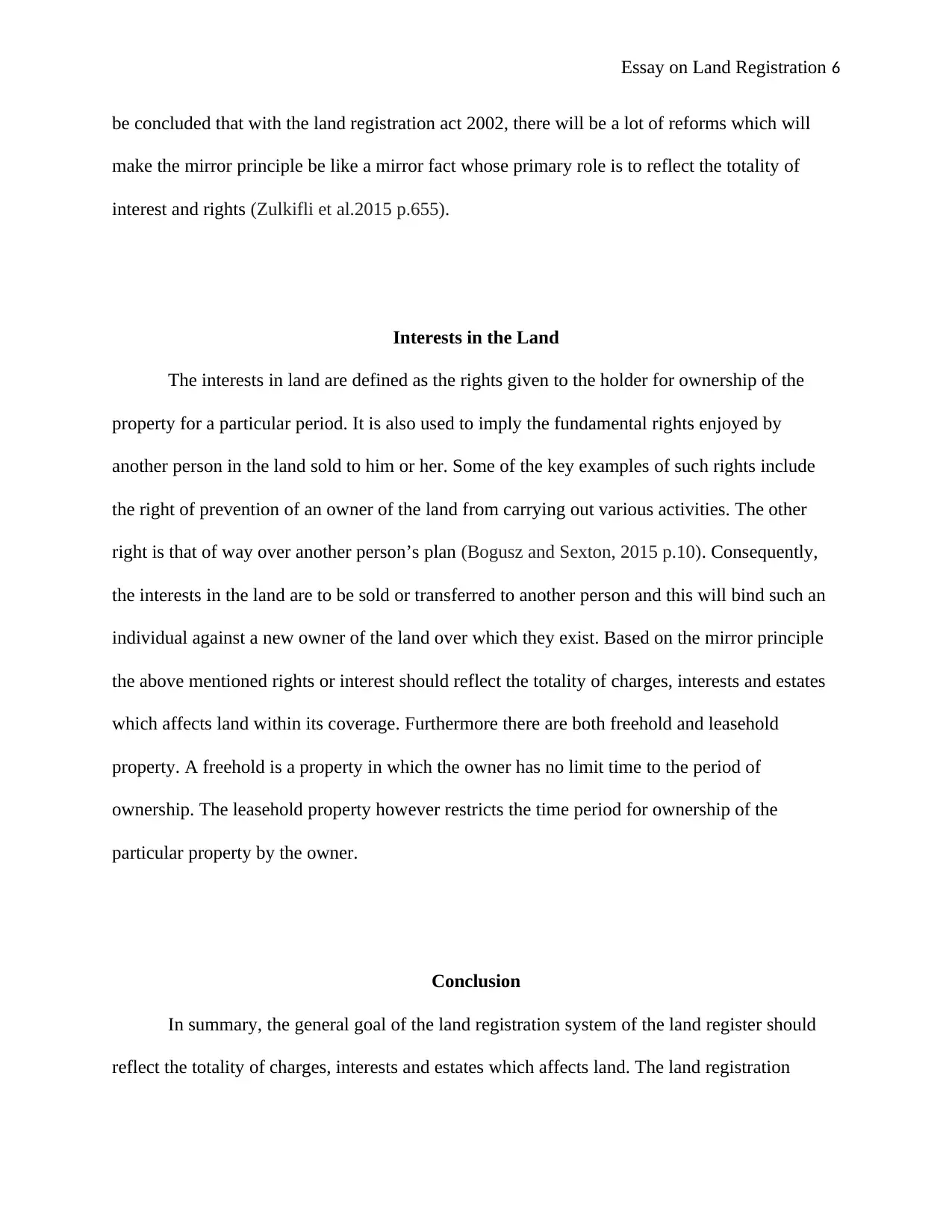
Essay on Land Registration 6
be concluded that with the land registration act 2002, there will be a lot of reforms which will
make the mirror principle be like a mirror fact whose primary role is to reflect the totality of
interest and rights (Zulkifli et al.2015 p.655).
Interests in the Land
The interests in land are defined as the rights given to the holder for ownership of the
property for a particular period. It is also used to imply the fundamental rights enjoyed by
another person in the land sold to him or her. Some of the key examples of such rights include
the right of prevention of an owner of the land from carrying out various activities. The other
right is that of way over another person’s plan (Bogusz and Sexton, 2015 p.10). Consequently,
the interests in the land are to be sold or transferred to another person and this will bind such an
individual against a new owner of the land over which they exist. Based on the mirror principle
the above mentioned rights or interest should reflect the totality of charges, interests and estates
which affects land within its coverage. Furthermore there are both freehold and leasehold
property. A freehold is a property in which the owner has no limit time to the period of
ownership. The leasehold property however restricts the time period for ownership of the
particular property by the owner.
Conclusion
In summary, the general goal of the land registration system of the land register should
reflect the totality of charges, interests and estates which affects land. The land registration
be concluded that with the land registration act 2002, there will be a lot of reforms which will
make the mirror principle be like a mirror fact whose primary role is to reflect the totality of
interest and rights (Zulkifli et al.2015 p.655).
Interests in the Land
The interests in land are defined as the rights given to the holder for ownership of the
property for a particular period. It is also used to imply the fundamental rights enjoyed by
another person in the land sold to him or her. Some of the key examples of such rights include
the right of prevention of an owner of the land from carrying out various activities. The other
right is that of way over another person’s plan (Bogusz and Sexton, 2015 p.10). Consequently,
the interests in the land are to be sold or transferred to another person and this will bind such an
individual against a new owner of the land over which they exist. Based on the mirror principle
the above mentioned rights or interest should reflect the totality of charges, interests and estates
which affects land within its coverage. Furthermore there are both freehold and leasehold
property. A freehold is a property in which the owner has no limit time to the period of
ownership. The leasehold property however restricts the time period for ownership of the
particular property by the owner.
Conclusion
In summary, the general goal of the land registration system of the land register should
reflect the totality of charges, interests and estates which affects land. The land registration
⊘ This is a preview!⊘
Do you want full access?
Subscribe today to unlock all pages.

Trusted by 1+ million students worldwide
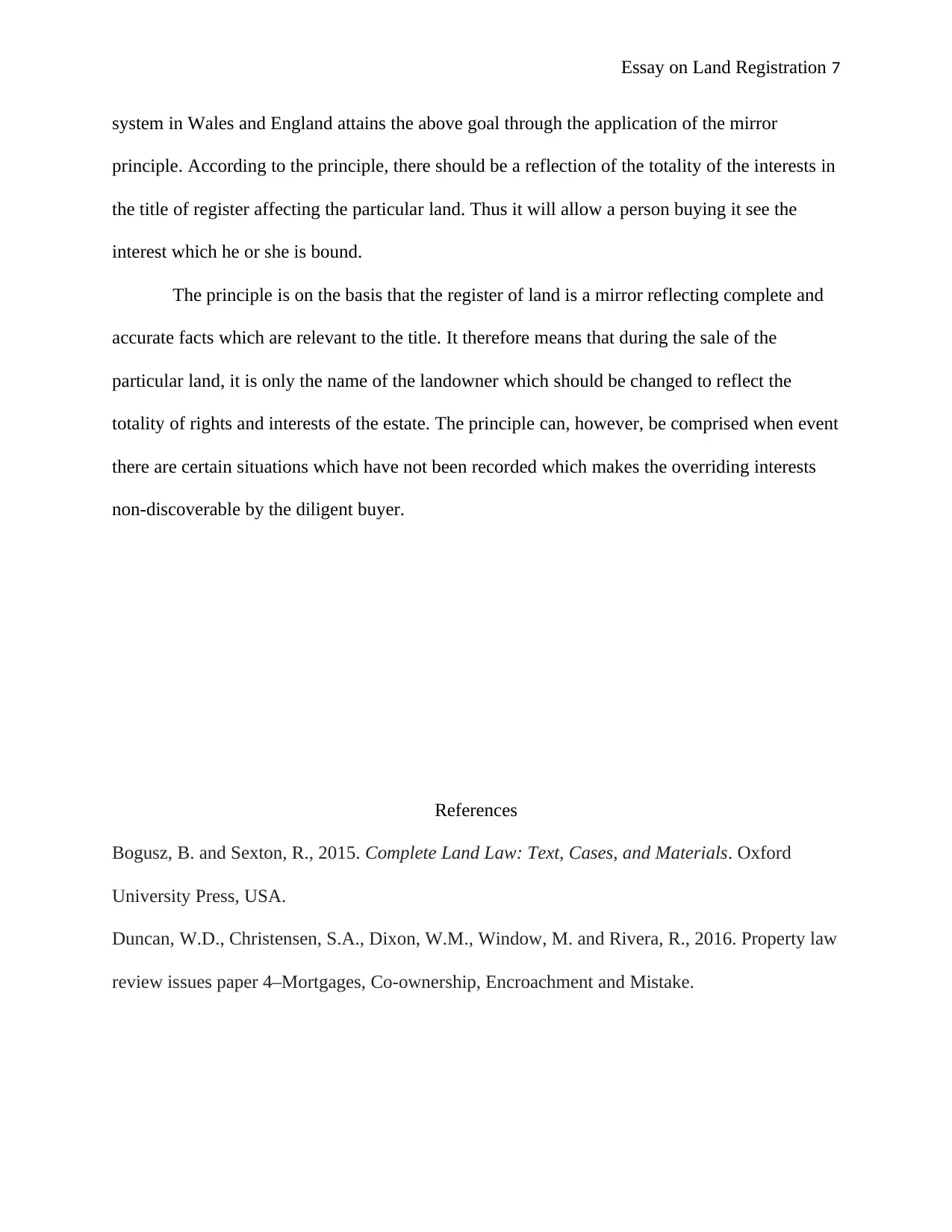
Essay on Land Registration 7
system in Wales and England attains the above goal through the application of the mirror
principle. According to the principle, there should be a reflection of the totality of the interests in
the title of register affecting the particular land. Thus it will allow a person buying it see the
interest which he or she is bound.
The principle is on the basis that the register of land is a mirror reflecting complete and
accurate facts which are relevant to the title. It therefore means that during the sale of the
particular land, it is only the name of the landowner which should be changed to reflect the
totality of rights and interests of the estate. The principle can, however, be comprised when event
there are certain situations which have not been recorded which makes the overriding interests
non-discoverable by the diligent buyer.
References
Bogusz, B. and Sexton, R., 2015. Complete Land Law: Text, Cases, and Materials. Oxford
University Press, USA.
Duncan, W.D., Christensen, S.A., Dixon, W.M., Window, M. and Rivera, R., 2016. Property law
review issues paper 4–Mortgages, Co-ownership, Encroachment and Mistake.
system in Wales and England attains the above goal through the application of the mirror
principle. According to the principle, there should be a reflection of the totality of the interests in
the title of register affecting the particular land. Thus it will allow a person buying it see the
interest which he or she is bound.
The principle is on the basis that the register of land is a mirror reflecting complete and
accurate facts which are relevant to the title. It therefore means that during the sale of the
particular land, it is only the name of the landowner which should be changed to reflect the
totality of rights and interests of the estate. The principle can, however, be comprised when event
there are certain situations which have not been recorded which makes the overriding interests
non-discoverable by the diligent buyer.
References
Bogusz, B. and Sexton, R., 2015. Complete Land Law: Text, Cases, and Materials. Oxford
University Press, USA.
Duncan, W.D., Christensen, S.A., Dixon, W.M., Window, M. and Rivera, R., 2016. Property law
review issues paper 4–Mortgages, Co-ownership, Encroachment and Mistake.
Paraphrase This Document
Need a fresh take? Get an instant paraphrase of this document with our AI Paraphraser
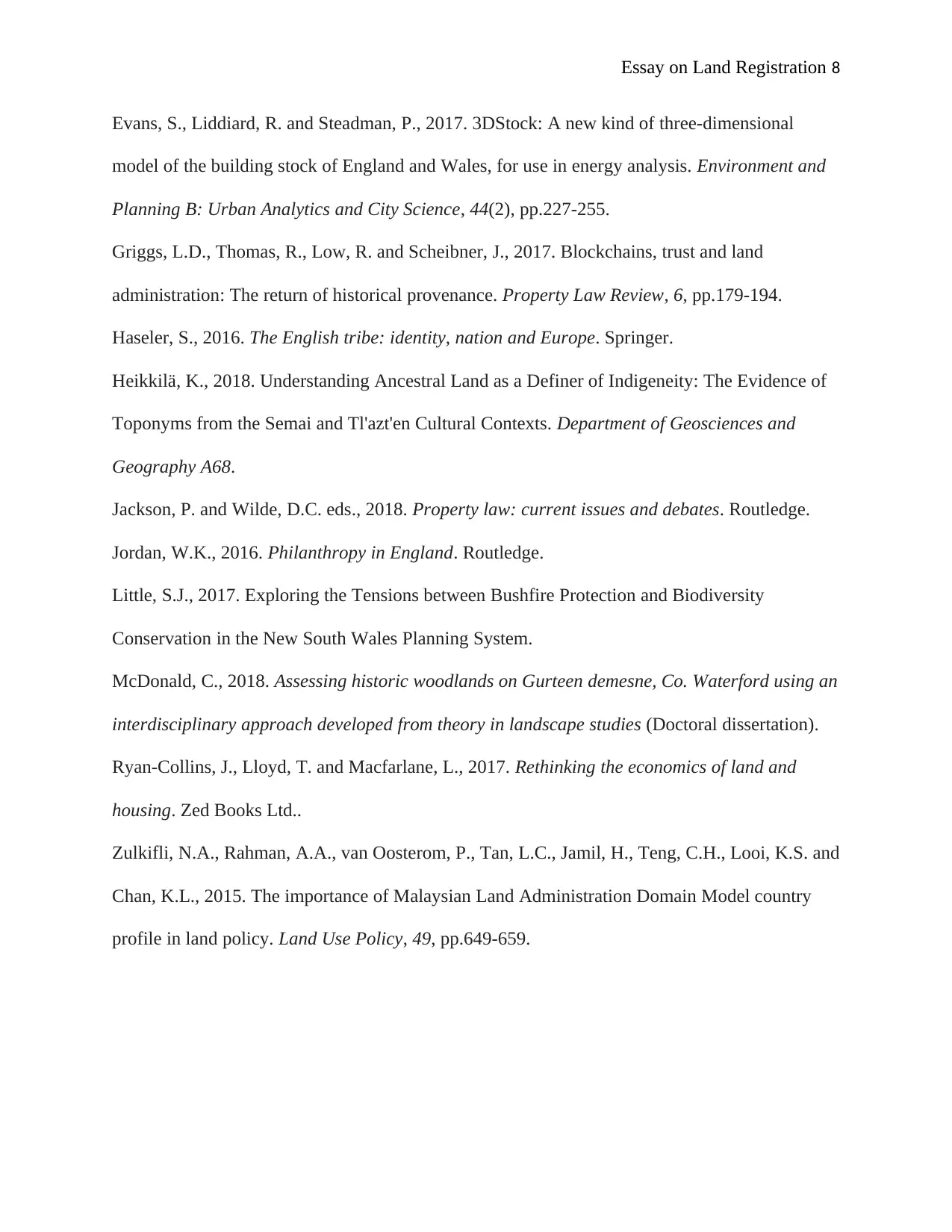
Essay on Land Registration 8
Evans, S., Liddiard, R. and Steadman, P., 2017. 3DStock: A new kind of three-dimensional
model of the building stock of England and Wales, for use in energy analysis. Environment and
Planning B: Urban Analytics and City Science, 44(2), pp.227-255.
Griggs, L.D., Thomas, R., Low, R. and Scheibner, J., 2017. Blockchains, trust and land
administration: The return of historical provenance. Property Law Review, 6, pp.179-194.
Haseler, S., 2016. The English tribe: identity, nation and Europe. Springer.
Heikkilä, K., 2018. Understanding Ancestral Land as a Definer of Indigeneity: The Evidence of
Toponyms from the Semai and Tl'azt'en Cultural Contexts. Department of Geosciences and
Geography A68.
Jackson, P. and Wilde, D.C. eds., 2018. Property law: current issues and debates. Routledge.
Jordan, W.K., 2016. Philanthropy in England. Routledge.
Little, S.J., 2017. Exploring the Tensions between Bushfire Protection and Biodiversity
Conservation in the New South Wales Planning System.
McDonald, C., 2018. Assessing historic woodlands on Gurteen demesne, Co. Waterford using an
interdisciplinary approach developed from theory in landscape studies (Doctoral dissertation).
Ryan-Collins, J., Lloyd, T. and Macfarlane, L., 2017. Rethinking the economics of land and
housing. Zed Books Ltd..
Zulkifli, N.A., Rahman, A.A., van Oosterom, P., Tan, L.C., Jamil, H., Teng, C.H., Looi, K.S. and
Chan, K.L., 2015. The importance of Malaysian Land Administration Domain Model country
profile in land policy. Land Use Policy, 49, pp.649-659.
Evans, S., Liddiard, R. and Steadman, P., 2017. 3DStock: A new kind of three-dimensional
model of the building stock of England and Wales, for use in energy analysis. Environment and
Planning B: Urban Analytics and City Science, 44(2), pp.227-255.
Griggs, L.D., Thomas, R., Low, R. and Scheibner, J., 2017. Blockchains, trust and land
administration: The return of historical provenance. Property Law Review, 6, pp.179-194.
Haseler, S., 2016. The English tribe: identity, nation and Europe. Springer.
Heikkilä, K., 2018. Understanding Ancestral Land as a Definer of Indigeneity: The Evidence of
Toponyms from the Semai and Tl'azt'en Cultural Contexts. Department of Geosciences and
Geography A68.
Jackson, P. and Wilde, D.C. eds., 2018. Property law: current issues and debates. Routledge.
Jordan, W.K., 2016. Philanthropy in England. Routledge.
Little, S.J., 2017. Exploring the Tensions between Bushfire Protection and Biodiversity
Conservation in the New South Wales Planning System.
McDonald, C., 2018. Assessing historic woodlands on Gurteen demesne, Co. Waterford using an
interdisciplinary approach developed from theory in landscape studies (Doctoral dissertation).
Ryan-Collins, J., Lloyd, T. and Macfarlane, L., 2017. Rethinking the economics of land and
housing. Zed Books Ltd..
Zulkifli, N.A., Rahman, A.A., van Oosterom, P., Tan, L.C., Jamil, H., Teng, C.H., Looi, K.S. and
Chan, K.L., 2015. The importance of Malaysian Land Administration Domain Model country
profile in land policy. Land Use Policy, 49, pp.649-659.
1 out of 8
Related Documents
Your All-in-One AI-Powered Toolkit for Academic Success.
+13062052269
info@desklib.com
Available 24*7 on WhatsApp / Email
![[object Object]](/_next/static/media/star-bottom.7253800d.svg)
Unlock your academic potential
Copyright © 2020–2026 A2Z Services. All Rights Reserved. Developed and managed by ZUCOL.





